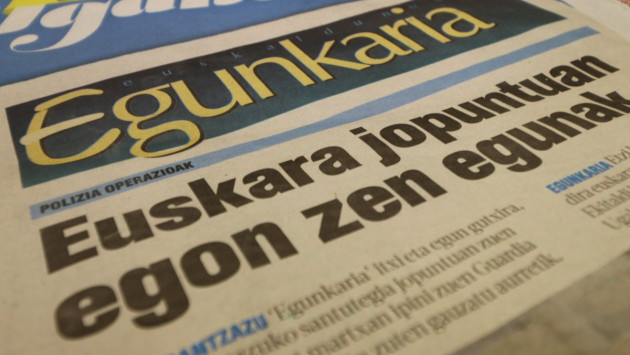Today, if you go to the Basque Country, you will see Basque media pretty much everywhere. There is a Basque-language television station, a Basque newspaper (Berria), Basque radio stations, and Basque magazines. There are bookstores full of books written in Euskara. However, the concept of a daily newspaper written entirely in Basque is relatively new. The publication of Egunkaria in 1990 changed the landscape for Basque media. Thirteen years later, Spanish authorities shut the newspaper down.

- The first issue of Egunkaria, meaning daily in Euskara, hit the stands on December 6, 1990. The idea for Egunkaria grew out of meetings that started in November, 1989, based on the principles of being aimed at Basque-speakers; having a national, broad, and united appeal; being independent of political parties and the Spanish media; and being non-institutional but subsidized. By 2003, it contained an average of 70 pages, sold 15,000 copies, and reached 44,000 readers.
- In February, 2003, Spanish judge Juan del Olmo ordered the newspaper to be shut down. The Guardia Civil raided the newspaper’s offices and froze their assets. The charges were “illegal association” and “membership of, or collaboration with, ETA.” The newspaper was forced into liquidation by these charges, essentially ceasing to exist. A similar fate had hit the newspaper Egin only a few years before. Several people associated with the paper were arrested and detained, including Iñaki Uria, Joan Mari Torrealdai, Txema Auzmendi, Xabier Alegria, Pello Zubiria, Xabier Oleaga, and Martxelo Otamendi. Several of these men reported being tortured while held by the Spanish authorities.
- The closure of the newspaper sparked international outcry. The British newspaper The Independent made a donation to help Egunkaria‘s eventual replacement, Berria, get going. Famed writer Salman Rushdie, then president of the PEN America, spoke out in support of the defendants. A number of human rights organizations also protested these actions.
- Almost immediately after Egunkaria‘s closure, a new temporary daily newspaper, Egunero, was published, the first issue released on February 21, 2003 with a circulation of 50,000. And, in June, 2003, a more permanent replacement, Berria, hit the stands, with Martxelo Otamendi, former director of Egunkaria, as its director. Berria is still being published.
- The criminal case against Egunkaria and the men detained was finally settled in 2010, by which time Egunkaria had long ceased to exist. The Criminal Court of the Audiencia Nacional of Spain stated that there was no grounds to have the newspaper closed. Specifically, they said that “the narrow and erroneous view according to which everything that has to do with the Basque language and with culture in that language is promoted and/or controlled by ETA leads to an incorrect assessment of facts and figures, and to the inconsistency of the accusation” and that “the allegations have not proven that the defendants have the slightest relation with ETA, and this determines in itself the acquittal with all pronouncements favorable to the defendants.”
- One of those defendants, Joan Mari Torrealdai, died on July 31, 2020 of cancer that he said was caused by the torture he had received. Not only was Torrealdai instrumental in Egunkaria — he was President of the newspaper’s Administration Council — he was editor of the journals Jakin and Anaitasuna, Chairman of the PuntuEUS Foundation, and the author of many books focused on Basque writing and language. In 2007, he was made a full member of Euskaltzaindia, the Royal Academy of the Basque Language). He was 78 years old.
Primary sources: Wikipedia: Egunkaria (English); Wikipedia: Egunkaria (Euskara); Egunkaria.info.
Discover more from Buber's Basque Page
Subscribe to get the latest posts sent to your email.


Greetings,
oh I wish that my uncle Luis and my Dad could read the article of el Temps!!They both would have more to say about the Guardia civil than Marico de merda!!!
Your posts may bring back some sad memories to some but I do not think that the new generation really grasp the misery the Basque people as well as the rest of the Pyrenees suffered during the time of Franco and the ramifications of Franco’s government that lasted beyond his death.
Keep up the good work.
Monique
I have to say, Monique, that I don’t fully appreciate all that happened during those times. It is hard for someone who didn’t live it to really know what the situation was. But, from what I have heard, it sounds horrible. I can only hope that the future is bright.